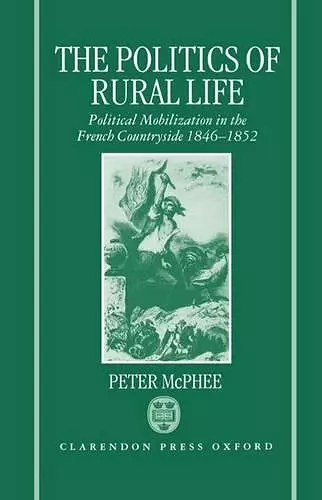The Politics of Rural Life
Political Mobilization in the French Countryside 1846-1852
Format:Hardback
Publisher:Oxford University Press
Published:28th May '92
Currently unavailable, and unfortunately no date known when it will be back

Peter McPhee has written the first full scholarly study of rural politics in France during the Second Republic (1848-1852). The Revolution of 1848 and the subsequent regime changed the face of mass politics in France; unprecedented numbers of French men and women participated in legal and illegal forms of political activity during a period of protracted crisis ultimately resolved by a military coup d'état. In exploring the neglected history of rural France in this period, the book draws on hundreds of regional studies to examine the large-scale political mobilizations of right and left in the countryside, and offers a new synthesis and interpretation of these years. Dr McPhee shows that rural politics were both more complex and more threatening to urban élites than has been generally recognized, and provides a lucid and scholarly analysis of a turbulent period in modern French history and its long-term social and political consequences.
`Frequently one reads books with one good idea in them: it is rare to find a work with three. Peter McPhee's The Politics of Rural Life is just such a book ... It would be an understatement to say that this is an ambitious work. Despite the complexity of the subject matter and the intricacy of the debates which surround the issues, McPhee's book is both accessible and coherent ... `The Political Geography of France', which includes McPhee's eloquent plea for a new historiographical approach to rural society. All historians, and anyone interested in the development of french political life, would benefit from reading this chapter alone ... The Politics of Rural Life seems set to become a standard work on this complex topic. Modern and Contemporary France 1993
`McPhee goes over some old ground, as well as some more recently added territory, but in a fresh and provocative way which offers new insights. ... McPhee has presented a convincing synthesis. ... fine book.' John M. Merriman, French History
'a brisk and passionate narrative ... an extended critique of the historiography of 1848' R.A. Jonas, University of Washington, Choice, Apr '93
'Frequently one reads books with one good idea in them: it is rare to find a work with three. Peter McPhee's The Politics of Rural Life is just such a book. It would be an understatement to say that this is an ambitious work. Despite the complexity of the subject matter and the intricacy of the debates which surround the issues, McPhee's book is both accessible and coherent. 'The Political Geography of France'. which includes McPhee's eloquent plea for a new historiographical approach to rural society. All historians, and anyone interested in the development of French political life, would benefit from reading this chpater alone. The Politics of Rural Life seems set to become a standard work on this complex topic.' KSharif Gemie, Cheltenham and Gloucester College of Higher Education, Modern & Contemporary France, 1993
'This is indeed an important and stimulating book, which deserves a place on the shelves of all interested scholars.' Malcolm Crook, The Agricultural History Review
' McPhee's work is a welcome addition to the studies that are demonstrating the complexity of peasant responses to the modern world.' Liana Vardi, The Journal of Peasant Studies, Vol. 21, No. 1, Oct '93
'Peter McPhee's new book is both an admirable synthesis of recent work on the French Second Republic and an effort of his own to explain why peasants made the political choices they did... McPhee's command of the literature is impressive as is his ability to shape it into a framework of narrative and analysis that does justice to the complexity of the issues at hand. McPhee makes a provocative case for the relative autonomy of rural politics and for the need to view that politics on its own terms. Edward Berenson, Journal of Historical Geography, No. 20, Vol. 1, 1994
ISBN: 9780198202257
Dimensions: 223mm x 144mm x 24mm
Weight: 550g
320 pages